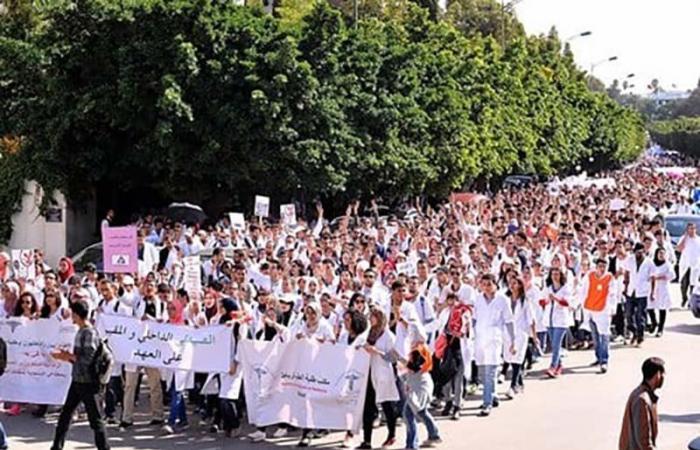The protest by medical and dental students continues to gain momentum in Morocco. This Tuesday, October 1, a day of national boycott of classes was declared in all faculties of the kingdom, in solidarity with medical students, whose strike has now lasted more than nine months.
This general mobilization follows the recent arrests of 27 students, boarders and residents, in Rabat, after a demonstration which degenerated into clashes with the police. Indeed, the situation became particularly tense after these arrests. The students have since been prosecuted while on provisional release.
The charges against them include “unauthorized assembly” and “insubordination,” offenses punishable by up to three years in prison. This legal response is seen as an escalation by student organizations, who consider that the government is seeking to repress a legitimate movement by force.
A movement that spreads
If the protest was until now limited to medical students, it has gradually spread to other university sectors. The National Union of Moroccan Students (UNEM) called for this day of boycott to denounce the “strong” intervention of the authorities during the latest demonstrations, thus marking a new phase in this conflict.
Now, student organizations from different disciplines, including engineering schools and other higher education sectors, are showing their solidarity with medical students and saying they are ready to engage in the struggle.
A legal standoff that aggravates the crisis
This Tuesday, October 1, is therefore seen as a pivotal date, where the boycott of classes in all faculties and schools across the country intends to put pressure on the government to respond to students’ demands. The latter denounce difficult training conditions, inadequate infrastructure, as well as the absence of job prospects, particularly for interns and residents.
In addition, the sit-in planned for October 15 in front of Parliament will be a crucial moment in this mobilization. Medical students, supported by various organizations and unions, intend to show that they will not back down, despite increasing pressure from the authorities.
Does the widening protest threaten the stability of the education sector?
That said, Tuesday’s boycott day may just be the beginning of a much larger solidarity movement. The National Coordination of Engineering Students announced its support for medical students and said it was ready to participate in new protest actions.
In a statement, she expressed outrage at what she saw as a “violent repression” of the protests and urged all students to join the movement. This cross-sector solidarity could amplify the protests and put even more pressure on the government.
Political groups, particularly those in the opposition, are also beginning to seize the opportunity to exploit this movement to weaken the majority. The Justice and Development Party (PJD) took a position in favor of the students and holds the head of government, Aziz Akhannouch, responsible for the deterioration of the situation.
A political and social challenge for the government
With the medical students’ strike transforming into a national crisis affecting several sectors of higher education, the Moroccan government finds itself facing a real challenge. The repression of protests and legal proceedings against students could well make the situation worse, prompting more students to join the protest movement.
The mobilization of this Tuesday, October 1 will therefore be a decisive test to measure the real scale of the protest. If the boycott proves to be massive and prolonged, the government could be forced to review its strategy in the face of a movement that is gaining intensity and popular support.






